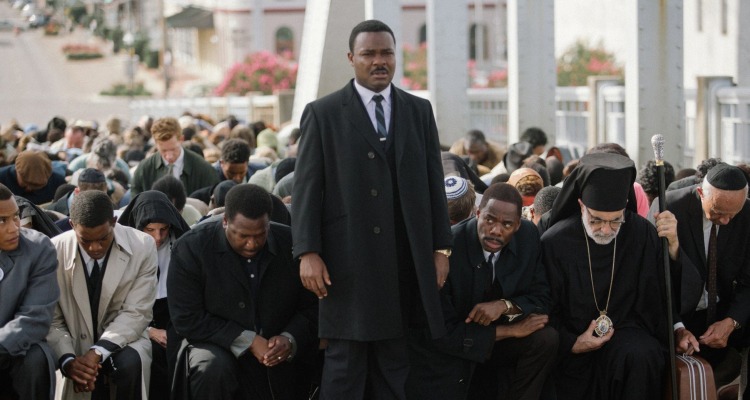 (4.5 / 5)
(4.5 / 5)
Why was Selma largely overlooked by The Academy?
Given its pedigree, it should, by most standards, have been a lock. What then? Could it be backlash from last year’s choice of Best Picture – have voters grown tired of slavery and segregation? – or is there something more fundamental about Ava Duvernay’s stirring civil rights drama that failed to engage?
The film opens with a peace-shattering explosion, one that henceforth leave us distrustful of every quiet, serene moment. If death could come to these people and then, death born of prejudice, intolerance, then no wonder it is never too far from the thoughts of the grave Martin Luther King Jr. (David Oyelowo) or his dignified wife Coretta (Carmen Ejogo).
Oyelowo’s performance, while stupendous, is one that give the Oscars little to hang their hat on. There’s nothing torturously showy about it, a la Michael Keaton in Birdman, or technically impressive, as with Eddie Redmayne in The Theory of Everything. He’s, simply put, a commanding presence; a deeply moral leader of men compelled by a belief in the innate dignity of all mankind.
The film is not a biopic of MLK but rather a document of certain events surrounding the march from Selma to Montgomery circa 1965. Opposed by the civil authorities and Old Boy thugs, MLK and his closest advisors chose Selma, Alabama, as the site where they would make a stand. Meanwhile, according to Selma, Lyndon B. Johnson dithered and J. Edgar Hoover spied.
Selma focuses on the moments that defined this moment in history: the aftermath of each tragic death is captured in gruelling slo-mo, the agony of the victims, the injustice. Those responsible, the world-weary, sardonic Governor Wallace (Tim Roth), the oafish Sheriff Clark (Stan Houston), and sour-faced, hypocritical Hoover (Dylan Baker) look on impassively.
As such, it’s up to gravelly Southerner MLK to make a difference, to force the hand of Tom Wilkinson’s ornery Johnson. Duvernay’s direction is full of vérité touches, capturing the kneeling figures, the men and women fleeing from tear gas and billy club. A compromise between Paul Greengrass’ Bloody Sunday and Spielberg’s Lincoln, Selma both represents and informs.
The film never delves into the Voting Rights Act – which LBJ initially dismisses as “this voting thing” – but instead lends itself to the people most affected by its passage: Oprah Winfrey plays the formidable Annie Lee Cooper, denied her rights on the flimsiest pretext, while actors the caliber of Wendell Pierce, Giovanni Ribisi, and Cuba Gooding Jr. flesh out the supporting cast.
Selma is about a moment of hard-won change, to misquote Sam Cooke, a change born of struggle and fortitude. As John Legend’s closing track reminds us, however, with its mentions of Ferguson and other sins of the more recent past, the victory is not complete.
Perhaps that’s why The Academy can’t see fit to reward Selma: the story’s not over yet.
